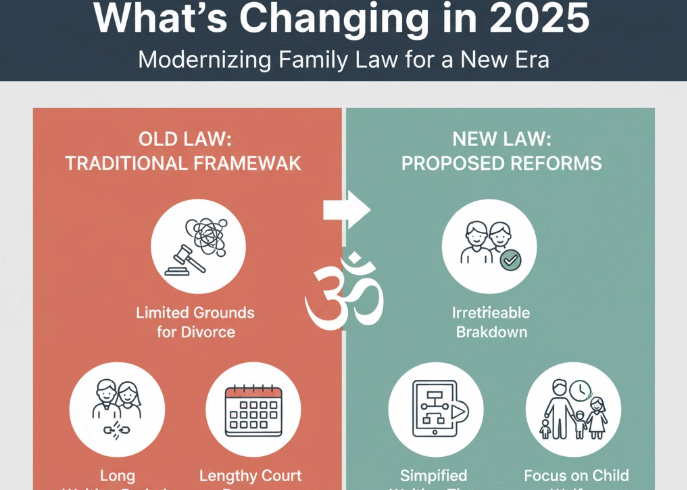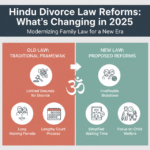Interreligious Marriages and Divorce: Legal Issues in India
When romance blossoms between people of different faiths in India, couples are often run through a gauntlet of legal obstacles that can make the pursuit of love a grueling experience. India may celebrate its diversity but inter-faith marriages have to negotiate complex legal processes that differ according to religion, personal laws and cultural practices. This story simplifies the legal landscape for you by explaining all that you wanted to know about interfaith marriages and divorces in India.
Why Are Interfaith Marriages Different Here in India?
India is under a rare legal system in which various religions are governed by different personal laws. That is, a Hindu couple follows certain rules to marry and divorce, a Muslim couple follows certain other such rules, and a Christian couple has its own set of regimes. When two individuals from different religions fall in love and decide to marry, they must figure out whose legal system will govern their marriage.
An interfaith marriage is a union in which the partners each adhere to a different faith — for instance, a Jew and a Christian, a Muslim and a Christian, or another combination. Such marriages are fully legal in India, but couples need to be aware of their options and the legal consequences of whatever path they take.
Two Major Routes for Interfaith Couples
The Special Marriage Act, 1954
This is the most common option chosen by interfaith couples in India. The Special Marriage Act offers couples a civil marriage option, which does not involve either partner converting to that of the other’s religion. Think of it as a neutral plain that both parties traverse under their religious identity, creating a secularly defined legal union.
Key Features:
- No religious conversion required
- Both of them maintain their original faith
- Registration is mandatory
- There is a 30 day notice policy that needs to be followed
- Either parties should have stayed in India for 30 days prior to the marriage
The Registration Process:
It is a process that can be intricate and has multiple steps that couples must complete accordingly:
Notice Submission: Both the bride and groom submit a notice to Marriage Officer under whose jurisdiction where at least one partner has resided for not less than 30 days.
Public Display: The notice is exhibited in public for 30 days at the office of the marriage officer. This gives an opportunity for anyone who has grounds to object.
Objection: In case of any objection, the Marriage Officer conducts inquiries. Objection of the marriage removed only if objections are without sufficient evidence it can be clearly proven not valid.
Ritual of Marriage: On the arrival of the 30th day (if no valid objection has been received), marriage can be celebrated in front of the Marriage Officer with minimum three witnesses.
Provide a Certificate: The couple gets a marriage certificate — the piece of paper signed by those present to verify their vows.
Marriage under Personal Laws with Conversion
Some couples opt to get married under one partner’s personal law, which demands religious conversion. If a Hindu wishes to marry a Muslim under Muslim personal law, for instance, one of the partners usually converts to Islam. Same way in Hindu marriage under Hindu Marriage Act both the person should be Hindus.
Important Considerations:
- The change must be real and it has to be voluntary
- Forced conversions are illegal and carry the death penalty
- The converting spouse follows the personal laws of his or her new religion
- This decision impacts wills, titles and divorce filings
Legal Challenges During Marriage
| Challenge | Impact | Solution |
|---|---|---|
| Property Rights | Confusion as to ownership and succession | Proper documentation and wills |
| Children’s Religion | Disagreements on the religion to be followed | Legal agreement before marriage |
| Succession Laws | Different marital laws | Proper estate planning |
| Social Pressure | Opposition from family and society | Protection under Indian law |
| Documentation | Evidence of marriage | Keep the document safe |
Property and Inheritance Issues
Interfaith couples have unique challenges when they buy property or plan their estate. Hindu, Muslim and Christian succession laws are vastly different:
Hindu Law: Property devolves upon legal heirs under the provisions of Hindu Succession Act, 1956.
Muslim: Based on Sharia law with specific share for relatives.
Christian: Indian Succession Act, 1925 applies.
Special Marriage Act Couples: Indian Succession Act, 1925 is applicable
For interfaith couples, not to be confused, they should:
- Title everything in both names
- Make their wishes known in unambiguous, legal wills
- Speak with an attorney who has knowledge of interfaith succession considerations
- Keep docs updated after life events
Visit https://zistalegalis.com for expert legal guidance on interfaith marriage matters.
Children’s Religious Identity
How one should be born or raised is among the most emotionally-charged questions in interfaith marriage. Indian law doesn’t let parents decide, but disputes can arise during breakups or divorce.
Best Practices:
- Establish and agree upon children’s religious upbringing before you get married
- Get it in ink (though not necessarily legally binding)
- Maybe to both faiths?
- Emphasize values instead of old-fashioned religious traditions
- Always have the best interests of the child in mind
The Process of Divorce in an Interfaith Marriage
Divorce is complicated in interfaith marriages, since the law that applies hinges on how a couple was married.
Divorce Under Special Marriage Act
If couples marry under Special Marriage Act 1954 they should apply for divorce as per the same Act. The grounds for divorce are on the same lines as those in the Hindu Marriage Act.
Valid Grounds for Divorce:
- Adultery: When a husband or wife has consensual sexual intercourse with another person
- Cruelty: Physical or mental torture that makes cohabitation intolerable
- Desertion: A spouse abandons the other, physically or mentally, for at least two years
- Conversion: When one spouse converts to a different religion
- Mental Disorder: The mental state of an individual who is unsound mind
- Leprosy: Contracting and remaining in an ‘incurable’ leperous condition
- Sexually Transmitted Disease: Communicable venereal disease in a communicable form
- Renunciation: One of the spouses renouncing the world
- Presumption of Death: One of the spouses has been unheard of for seven years
Divorce Timeline:
Filing Petition (Day 1) → Notice to Other Spouse (15-30 days) → First Hearing (30-60 days) → Mediation Attempts (3-6 months) → Evidence and Arguments (6-12 months) → Final Decree (12-24 months total)
Mutual Consent Divorce
This is the shortest duration when both spouses agree to part ways. Couples may file for mutual consent divorce under the Special Marriage Act, if they have been living apart for at least one year.
The Steps Are As Follows:
- Joint Petition, First Motion: Court records statement of parties
- 6-month cooling period
- Second Motion: If both parties agree, the court grants divorce
- Divorce Decree
This may be done in 6-18 months depending on court duty and the cooling period being allowed.
Contested Divorce
Contested Divorce is not as quick as Mutual Divorce, but it is costly, time-consuming, and emotionally exhausting.
- Multiple court hearings over 2-5 years
- Documentation and evidence check
- Legal fees are higher
- Alimony, child custody, and ownership argument
- The likelihood of an appeal

Child Custody
When it comes to the child, the highest consideration in India is the welfare of the child. Religion is a factor, but it is not dispositive.
Courts Will Consider:
Child’s Age:
- Under 5, the child will stay with the mother pursuant to the theory of tender years
- Over 5, the child’s choice will be taken into account
- After 10, child’s consent is binding
Other Factors:
- Financial resources
- The economic status of the parents
- Education
- Health
- The child’s emotional bond with the parents
- How each of you plans to address religious education
- Exposure to both faiths
- Avoiding religious indoctrination
Types of Custody
| Type of Custody | Description | When It’s Awarded |
|---|---|---|
| Physical Custody | Child lives with this parent | Dependent on the child’s best interest |
| Legal Custody | Ability to make child-life decisions | Can be joint/shared or sole |
| Joint Custody | Held by both parents | When both can cooperate |
| Visitation | The time a non-custodial parent gets with the child | Virtually always granted |
Alimony and Financial Support
Money decisions in an interfaith divorce occur under the law by which a couple were married.
Under Special Marriage Act
Divorce Alimony is at the discretion of the Court and may be awarded based upon:
- Each spouse’s income and assets
- Standard of living during marriage
- Duration of marriage
- The age of the two parties, and their health
- Financial needs and obligations
- Earning capacity of both spouses
Types of Alimony:
- Pendente Lite Alimony: Alimony paid during the divorce trial
- Permanent Alimony: Ongoing monthly payments after divorce
- Lump Sum Alimony: One-time payment
- Rehabilitative Alimony: Support until recipient becomes self-supporting (Average 1/2 length of marriage depending on duration of marriage’s subsistence)
Child Support
The parent who does not have custody is expected to pay his proportionate share of the child’s expenses, like:
- Education fees
- Medical costs
- Daily living expenses
- Extracurricular activities
- Future needs (higher education, marriage)
Generally, the required percentage of income is 25-30% for one child and will change from case to case.
Frequent Legal Barriers Faced By Interfaith Couples
Proving the Marriage
If at the initial stages itself a couple fails to register their marriage properly, arguing for its legal existence during divorce becomes difficult. Always store your marriage certificate in a secure location and make copies.
Jurisdictional Confusion
Jurisdiction lies in various courts depending on:
- Where the marriage was registered
- Where the couple most recently lived together
- Where the respondent currently lives
Filing in the wrong court can set back the case by months, even years.
Religious Personal Law Complications
If one person converted to get married but later reverts back to one’s former religion, that creates thorny legal questions about which law applies to the ending of the marriage.
Family Pressure and Social Stigma
Not a legal problem, but the family can complicate the legal process. Families may file false cases or agitate during property allotment.
Anti-Conversion Laws
A number of Indian states have passed laws against forced religious conversion, known as “love jihad” laws. Intended to deter forced conversions, these laws occasionally ensnare interfaith couples — particularly if one partner converts for marriage.
States with Anti-Conversion Laws (as of 2024-2025):
- Uttar Pradesh
- Uttarakhand
- Himachal Pradesh
- Madhya Pradesh
- Karnataka
- Haryana
- Gujarat
- Odisha
These laws typically require:
- Prior notice to the authorities before conversion
- Investigation by district authorities
- Proof that conversion is voluntary
- Waiting periods
Interfaith couples should be aware of these laws in their state and make certain that all conversions (if any) are well documented and freely entered into.
Practical Tips for Interfaith Couples
Before Marriage
Document Everything:
- Get your marriage registered immediately
- Make copies of your marriage certificate
- Keep proof of age, identity and residency
- If conversion took place, retain conversion certificates
Financial Planning:
- Open joint bank accounts
- Register property in both names
- Create wills specifying your wishes
- Consider pre-nuptial agreements (though not common in India)
Legal Consultation:
- Consult with a family law lawyer at https://zistalegalis.com
- Understand your rights and obligations
- Address any potential problems beforehand
- Know the laws that govern your marriage
During Difficulties
Seek Mediation:
- Try family counseling first
- Use court-annexed mediation services
- Consider religious or community mediation
- Keep communication open
Protect Your Interests:
- Record acts of cruelty or misconduct
- Keep financial records organized
- Don’t leave the marital home without getting legal advice
- Secure important documents
Think About Children:
- Minimize their exposure to conflict
- Don’t use them as messengers
- Consider their emotional well-being
- Keep their routine stable
During Divorce
Hire a Good Lawyer:
- Hire someone with experience in interfaith divorces
- Make sure they are familiar with the personal laws of both religious traditions
- Negotiate rates and payment terms in advance
- Maintain regular communication
Be Realistic:
- Divorce takes time in India
- Courts are backlogged
- Compromise when possible
- Focus on important issues
Maintain Records:
- Copy anything you file at the courthouse
- Document all financial transactions
- Save all communication with your spouse
- Track legal expenses
Recent Changes and Developments
Supreme Court Rulings
A look at few significant judgments by the Indian Supreme Court that have an impact on interfaith marriages:
Shafin Jahan v. Asokan K.M. (2018): The court upheld the right to marry a person of his/her choice provided he/she has attained majority irrespective of religion professed by either party. This case reiterated that consent of the parent or society is not necessary for marriage.
Lata Singh vs. State of Uttar Pradesh (2006): Adult citizens cannot be forced to marry a person of their parents’ choice; and society should hail interfaith marriages as part of an inclusive secular society. The court ruled that people have right to choose their spouses. The consent is crucial for both man and woman.
Salamat Ansari vs. State of Uttar Pradesh (2021): The Supreme Court ordered police protection for interfaith couples who are being threatened and accepted that such relationships encounter difficulties.
Proposed Uniform Civil Code
There’s still debate about enacting a Uniform Civil Code (UCC) that would give the same marriage and divorce laws to every Indian, irrespective of religion. As of October 2025:
- Uttarakhand has implemented a UCC
- Similar legislation in other states are under consideration
- This would make interfaith unions easier going forward
- Implementation timeline remains uncertain
For more information on the Uniform Civil Code, visit the Law Commission of India website.
What International Couples Need to Know
There are some more points to consider where one partner is an Indian citizen and the other a foreign national:
Marriage Requirements:
- Foreigners have to get a “Certificate of No Impediment” from their embassy
- Tourist visa holders cannot get married in India (special permission required)
- Marriages should be registered with the FRRO (Foreigners Regional Registration Office)
Divorce Complications:
- Jurisdictional issues become more complex
- International laws may apply
- Order enforcement across borders is challenging
- Additional legal costs

Frequently Asked Questions
Q1: Are we expected to convert to each other’s faiths in order for us to get married?
No, you need not be a convert. You have the right to marry under the Special Marriage Act, 1954, without converting to another religion. The spouses don’t need to convert. But, if you are marrying under a personal law (like Hindu Marriage Act or Muslim Personal Law), conversion may be necessary.
Q2: How long does the divorce in interfaith marriages take?
For divorce by mutual consent, typically 6-18 months. Contested divorces typically take 2-5 years or more, depending on how complicated the case is and whether there are long delays in court. The timeline can be very different depending on where you live, the reason for divorce, and how willing both parties are to work together.
Q3: Can my family object to me marrying someone of another faith?
Legally, no. If you’re an adult (18+ for women, 21+ for men as of some recent updates), you have the right to marry whomever you want. But during the 30-day notice period under the Special Marriage Act, anyone can object and these will then be investigated by the Marriage Officer. Valid legal reasons could stop your marriage, not family disapproval.
Q4: What about the faith of our children after separation?
When children are old enough to decide, they can then pick their religion. Until then, the courts base custody decisions on what is in the child’s best interest. The parent with custody generally has the most say over religious education, but a court can require that the child be introduced to both faiths. The interest of the child is always above the religious concern.
Q5: Is alimony necessary in interfaith divorces?
No, alimony is not automatic. Courts have full discretion. The determination is based upon a myriad of factors including the party with the greatest financial need, party’s earning capacity, standard of living enjoyed during marriage and the parties’ respective financial positions. Couples can arrange conditions of alimony in mutual consent divorces. In cases where both spouses work, the courts may not award alimony.
Q6: Can we make a prenuptial agreement when my future spouse is not of the same faith as me?
Prenuptial Agreements are rare in India and their enforceability is weak. But you can have agreements on property and financial matters, as well as an agreement about how children will be raised. Although courts may not always apply these in full, they take them into account when disputes arise. Better clear written agreements than nothing.
Q7: What if my spouse accuses that I converted him/her by force?
Under anti-conversion laws, false allegations are no laughing matter. Contact a lawyer right away and find evidence of voluntary conversion (if it occurred). Maintain documentation such as a certificate of conversion, statements from witnesses and anything written by your spouse about the intention to convert. Court will do in-depth investigation of such claims before it can act on them.
Q8: If I change religion, will my property rights be affected?
Conversion does not change property rights during marriage under the Special Marriage Act. But if you were married under personal law and convert, it can muddle inheritance and succession rights. Always consult a lawyer before you convert, and make sure your property is documented correctly in your name.
Final Thoughts
Interfaith marriages in India are a celebration of the beautiful diversity in our country, but they have their legal issues. Education, preparation and appropriate legal advice are the greatest tools for addressing these challenges.
Remember these essential points:
- Marry under appropriate laws
- Organize and store legal documents securely
- Set clear agreements about money and the kids before there are problems
- Get advice at the earliest when conflicts arise
- Think of the children in the argument
- Familiarize yourself with your rights and obligations under the law
Interfaith divorces can be complicated; however, several thousand couples are able to navigate it successfully each year. India is a complex country, but the courts of law in this country do give protection to individuals in interfaith marriages and grant them fair treatment when they file for a divorce.
If you’re in an interfaith marriage, or if you’re considering marrying someone from a different faith background, don’t let such legal complexities scare you off. With a bit of preparation, the right documents and professional input, you can get your relationship off to a solid start and be prepared for whatever comes at you.
The best thing to do is enter the relationship with honesty and open communication, respecting both of your backgrounds. Falling in love across religious boundaries is not only legal in India — but a validation of our nation’s pluralistic principles, and the age-old truth of human connectedness.
Whether you’re a newlywed, facing problems, or contemplating separation, know that there are laws in place and attorneys who will support you irrespective of your faith. Understand these rights, get appropriate advice (legal/financial) and make choices/decisions that are in the best interest of all parties (including kids).
Interfaith marriages take courage, commitment and understanding — but they also enrich our society by forming bridges between communities and proving that love transcends all boundaries.
For expert legal consultation on interfaith marriages and divorces, visit https://zistalegalis.com





